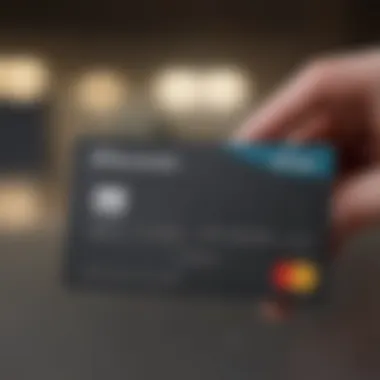A Complete Guide to Getting Your Discover Student Card


Intro
Applying for a credit card can be a significant step in managing your finances. The Discover Student Card offers an accessible option for students seeking to build their credit history. It also provides invaluable experience in handling credit responsibly, crucial in today's financial landscape. Understanding the full picture of obtaining this card will significantly improve one’s chances of approval and later success in using it. This guide presents a thorough breakdown of the application process, eligibility criteria, and best practices for credit management to ensure smooth sailing into your financial future.
Understanding Loans
Before diving into specifics about the Discover Student Card, comprehending different kinds of loans establishes a basis for financial literacy. Loans can be differentiated based on typical elements such as purpose, interest rates, and repayment terms.
- Types of loans: While the focus here is on credit management, being informed about student loans and personal auto loans can be distinctly advantageoous. Student loans help pay for education, while personal loans can cover other need, like tuition or emergencies.
- Loan eligibility criteria: Different loans vary in requirements, including credit history, income levels, enrollment status, and overall debt-to-income ratio, which needs understanding from how they impact credit.
- Pros and cons of taking out a loan: Loans often help students to meet educational expenses, but they can lead to debt and stress if mismanaged. Understanding the benefits and disadvantages offers better decision-making.
Navigating Credit Cards
Once a basic understanding of loans is in place, engaging with credit cards, especially the Discover Student Card, is next. Here, we detail how students should approach credit cards.
- Types of credit cards: Beyond the Discover Student Card, there are many forms; cashback, travel reward cards, and students should identify their needs before choosing.
- Credit card utilization tips: A critical factor in maintaining good credit is keeping utilization under 30% of available credit. Quickly making small charges and paying them off regularly builds a healthy credit score.
- Avoiding common credit card pitfalls: Young the individuals can be unaware of high interest rates and fees. Paying the minimum allowed versus the whole balance eventually can lead to spiraling debt.
End
In summary, navigating the financial landscape requires thorough knowledge and thoughtful action. With appropriate guidance and a solid understanding of loans, credit cards, and responsible spending, students can confidently maneuver through their goal of obtaining the Discover Student Card and establishing a strong credit foundation. Taking the time to pave the right path will result in less stress and clearer financial growth over time.
"An essential part of financial responsibility is learning to manage your credit wisely and understanding its implications on your overall financial health."
Understanding the Discover Student Card
Understanding the Discover Student Card is crucial for any individual wishing to embark on a path toward building credit. This specific credit card offers features tailored to meet the needs of students, providing not only a means of payment but also an initial foray into the world of credit management. Students entering higher education often face financial challenges, making a credit card like the Discover Student Card an essential tool. It assists in creating foundational credit history, which is pivotal for future financial opportunities.
Overview of Features and Benefits
The Discover Student Card encompasses several features that set it apart in the credit card market. Noteworthy benefits include cash back rewards on purchases, which could vary according to spending categories each quarter. For example, students frequently buy essentials in categories like groceries and dining out. Additionally, the card offers a complimentary FICO score check, enabling cardholders to stay informed about their credit standings.
Other features include no annual fees and the option for interest-free payments on purchases if paid in full each month. Learning to use credit responsibly is imperative, and this card facilitates that by offering tools for budgeting and monitoring. Importantly, as students establish their credit, they aim to secure favorable loan conditions in the future.
Target Audience
The Discover Student Card is specifically designed for college students, typically aged between eighteen and twenty-four. These individuals are often new to credit and may have limited or no credit history. This audience looks to gain financial independence, often seeking practical ways to manage their expenses while simultaneously building their credit score. As students goal to pursue higher education and navigate through various living costs, the Discover Student Card can help provide necessary financial resources while teaching responsible spending practices.
In summary, gaining an understanding of the Discover Student Card empowers students with essential knowledge for a financially stable future. The features and benefits of the card promote healthy financial habits and provide a platform for effective credit management.
Eligibility Criteria
Eligibility criteria serve as the foundation for applying successfully for the Discover Student Card. Understanding these conditions in advance is essential for ensuring your application aligns with what the issuer expects. This section will explore the key elements that could significantly influence your chances of approval.
Age Requirements
To apply for the Discover Student Card, you must be at least 18 years old. This age requirement aligns with many banking regulations that dictate when a person can enter into a legal financial agreement. If you are younger than 18, you may need to have a parent or guardian co-sign your application. Meeting this age requirement is essential because it shows the credit card issuer that you are legally capable of managing a credit account.
Enrollment Status in an Accredited Institution


Another critical eligibility factor is your enrollment status at an accredited post-secondary institution. Discover typically requires you to be a full-time student attending a school recognized by the Department of Education. A valid proof includes documentation such as your student ID or acceptance letter. This verification assures the issuer that your income source is consistent and likely, as students with such enrollment can access part-time jobs or internships that help in repaying any incurred debt.
Credit History Considerations
Your credit history—or lack of it—will also be a pivotal consideration during the application process. Discover is known to cater to students who may be applying for their first credit card. A solid financial history, albeit not strictly necessary for the student card, can enhance your chances of approval. However, if you have little to no history, your application should indicate responsible financial behavior in other areas.
A few things to note:
- If you're new to credit, consider getting a secured credit card or becoming an authorized user on someone else's account to establish a foundational credit profile.
- Regularly check your credit score through online platforms or credit report agencies to ensure all information is accurate.
It can significantly change your chances of obtaining credit, providing you have demonstrated responsibility when handling financial commitments. Keeping these criteria in focus will set a solid groundwork for approaching the application process.
Application Process
The application process for the Discover Student Card is crucial because it serves as the first step toward acquiring a valuable financial tool. The importance of understanding this process cannot be overstated. Proper preparation and knowledge of what is required can greatly increase your chances of successful approval. Understanding the types of documentation you need, the options for applying, and the essential steps involved ensures that you are well-equipped as a potential cardholder.
Gathering Necessary Documentation
Gathering the necessary documentation is an integral part of the application process. It ensures that all facts provided during the application are accurate.
Proof of Identity
Providing a proof of identity is a basic yet critical requirement when applying for the Discover Student Card. This document confirms that you are who you claim to be, minimizing the risk of fraud. A government-issued ID, such as a driver's license or passport, is the most common choice. The key characteristic of proof of identity lies in its widespread acceptance and reliability. The benefit of using these forms is their legal weight, effectively validating your identity. However, one drawback might be the requirement to have these documents on hand, which can be a challenge for new students.
Proof of Enrollment
Proof of enrollment demonstrates that the applicant is currently a student at an accredited institution. This documentation typically includes registration forms, college acceptance letters, or current enrollments showing class schedules. A key feature of proof of enrollment is that it specifically links your application to your status as a student, which is necessary for eligibility. This documentation highlights the importance of education in qualification for obtaining the credit card. However, students should be ready as varying institutions have different policies for providing these documents, which could cause delays.
Income Information
Income information addresses your financial capability to manage the credit card debt you might incur. This can include part-time job pay stubs, allowance from family, or any other income source. The key aspect of providing this information is that it portrays level of financial stability to creditors. Showing that you have a consistent income stream strengthens your application. But it's important to note that some students may not have substantial income, making it challenging to provide comprehensive income documentation.
Online vs.
Offline Application
The choice between an online or offline application method can significantly influence your application experience. Opting for an online application is generally more efficient. It can often be completed quickly, and confirmations are instant. On the other hand, an offline application allows individuals who prefer physical copies to apply with paper forms sent via mail. Each method has its potential pluses and minuses based on convenience, speed, and personal preferences. Regardless of the method chosen, ensure all documentation is accurate and fully complete to avoid delays in processing.
Steps to Complete the Application
Completing the application involves a series of clear, straightforward steps.
- Choose Your Application Method: Decide whether to apply online or through paper.
- Gather Documents: Collect proof of identity, proof of enrollment, and income information as discussed.
- Fill Out Application: Be thorough and precise in filling in personal information in the application form.
- Review Documentation: Ensure all documents are correct, included, and aligned with what is being submitted.
- Submit Application: Finally, submit your application through your chosen method.
Following these steps can enhance your ability to complete the application smoothly and avoid unnecessary bumps in the process.
Improving Approval Chances
Improving your chances of approval for the Discover Student Card involves a multifaceted approach focused on credit management practices. Understanding what financial institutions look for in applicants can provide an edge. In essence, many factors contribute to increasing the likelihood of receiving your desired approval. By honing in on specific areas such as credit scores, credit inquiries, and the accuracy of application information, applicants can reflect their financial responsibility.


Maintaining a Healthy Credit Score
Understanding Credit Scores
Understanding credit scores is fundamental ined your quest for the Discover Student Card. A credit score is a numerical expression representing an individual’s creditworthiness, based on credit history. Most lenders use FICO scoring models which range from 300 to 850. The higher your score, the more trustworthy you appear to potential creditors.
What makes understanding your credit score advantageous is knowing how various factors influence its calculation. These factors include payment history, amounts owed, length of credit history, types of credit in use, and new credit. Each has its significance. Notably, payment history holds the highest weight in scoring models.
Insufficient knowledge can lead to unintentional damaging actions, like applying for various credit lines without strategic consideration. Thus, grasping how tracking and maintaining a healthy score reflects one's reliability to lenders is critical in the application process.
Steps to Improve Your Score
Steps to improve your score will directly impacting your approval chances. One significant step is ensuring timely payments. Payment punctuality is strongly connected to your credit score. Establishing reminders or using automated payment services can be helpful.
Another key characteristic involves utilizing credit responsibly. Keeping the credit utilization ratio well below 30%, i.e., only using a portion of of available credit, can bolstering your score. Besides, regularly monitoring credit reports is also beneficial. Everyday imperritives include checking for inaccuracies, which can negatively affect your score.
These steps serve as beneficial actions for those aiming to improve their creditworthiness. Even subtle changes in spending can ripple positively across credit assessments, leading to favorable conditions for applying for financial products.
Limiting Credit Inquiries
Limiting credit inquiries can be critical in enhancing approval chances. Every time an institution checks your credit report when you apply for items like cards or loans, it generates a soft or hard inquiry. High volumes of hard inquiries can lower your score.
It is best to limit these inquiries by carefully choosing when to apply and potentially consolidating applications for credit checks within a short duration. Many lenders conduct soft inquiries which do not impact your score but allow them to assess your suitability.
Providing Accurate Information
Providing accurate information during your application cannot be overstated. Inaccuracies in contact information, identity validation, or enrollment proof can lead to delays or outright denials. Compound this with the importance of a consistent narrative and detailed truthfulness. Financial institutions assist you with accurate sources to verify identities further. Failing to comply with such basics might significantly jeopardize your approval chances.
It’s crucial to underscore how thorough draft checking for accuracy and eliminating conflicts, such as different home addresses or inconsistent employment records, translate into much higher likeliness for favorable findings in your application.
Post-Application Process
The post-application process is a critical phase that follows the submission of your application for the Discover Student Card. Understanding what to expect at this stage can significantly influence your experience and decision-making after applying. Knowing the potential outcomes of the application aids in setting realistic expectations and preparing for the next steps accordingly.
Understanding the Approval Timeline
Once you submit your application, it typically takes a few minutes to a couple of days for your application to be processed. Customers often receive their approval status swiftly, allowing only a short waiting period. However, in certain situations, further verification may be necessary which can delay the final decision.
Be mindful to check your email and phone as Discover will reach out to inform you about your application status. Moreover, this timeline might vary depending on various factors like weekend submissions or additional information needed on your application.
Responding to Approval or Denial
Next Steps if Approved
If you are fortunate enough to receive approval, congratulate yourself. This is arguably the most vital moment in the process. But next steps are equally essential to establishing a solid foundation on your credit journey. Accepting the card, confirming your identity, and setting up your online account is pivotal. With your card, you can begin utilizing its benefits which are important for building your credit history.
Being approved means that you'll need to view your monthly activities cautiously. The Discover Student Card has many advantageous features such as earning cashback and no annual fees; getting familiar with these will help you manage and strengthen your financial standing.


Options if Denied
If your application results in a denial, it may feel disappointing. It's essential not to panic. Multiple avenues exist post-denial that can help you re-engage with credit building. Reach out to Discover to determine the reasons behind the denial. This often illuminates which aspects of your creditworthiness need improvement.
From there, strategies like reviewing your credit report for mistakes, focusing on paying down existing debts, or working on increasing your credit score can markedly improve chances for future applications. Each option opens possibilities for life lessons but does require commitment to your financial health. Understanding and acting positively on potentially difficult news is a foundational aspect of responsible credit use.
Remember, overcoming a denial can often lead to stronger financial savvy, blending resilience with personal growth.
Using the Discover Student Card Responsibly
Using the Discover Student Card responsibly is essential for your financial wellbeing. Credit cards can be a very effective tool when managed right. However, careless use can lead to debt and adversely affect your credit history. Understanding how to handle this responsibility is important for students learning about credit and finances.
Building Credit History
Building a credit history is a key benefit of using the Discover Student Card carefully. Establishing credit early can set a solid foundation for future financial activities. This card allows for low-interest rates and a cap on spending, making it less risky for new users. It is crucial to make purchases that you can afford to pay back. Consistent and responsible usage will positively impact your credit score.
Managing Monthly Payments
Managing your payments each month is a vital part of using the Discover Student Card effectively. Two important strategies in this area are setting a budget and paying on time.
Setting a Budget
Setting a budget is more than putting numbers on paper. A good budget helps you control expenses. Recognizing how much money comes in and goes out is vital. For those with the Discover Student Card, sticking to a budget helps to prevent overspending and later regret.
A budget acts like a roadmap. It guides you toward your financial goals. If you stick to your budget, you are less likely to face financial issues in the future. Start by monitoring your spending and planning for expenses. A well-structured budget provides clarity and aids in better decisions.
A budget provides a safety net for students, ensuring they are prepared for necessary expenses while managing their credit wisely.
Paying on Time
Paying on time is another significant aspect. Timely payments enhance your credit score; consistent on-time payments can lead to increased credit limits and lower interest rates. It develops trust between you and lenders. This habit builds a positive credit history that highlights financial responsibility.
Being punctual with payments helps you avoid late fees. Forgetting payments can lead to added stress and debt. Therefore, creating reminders or setting auto-pay features is profitable. Staying organized pays off by keeping your overall costs down and ensuring better financial standing.
In summary, using the Discover Student Card with responsibility can lead to a good credit history. Manage your monthly payments through budgets and punctuality. Careful financial habits benefit you in the long term.
Epilogue
The importance of the conclusion in this article cannot be overstated. It serves as a critical synthesis of the main concepts discussed throughout the guide. Understanding how to effectively secure a Discover Student Card not only involves meeting eligibility benchmarks but also demands awareness of responsible credit usage.
With the echoes of individual preparedness ringing strong, the reader must grasp that approval for a credit card like the Discover Student Card often hinges on early proactive measures. What one does prior to application - such as maintaining a healthy credit score and gathering essential documentation - undoubtedly shapes the eventual outcome.
Recap of Key Steps
- Assess Eligibility: Verify that you meet the age, enrollment, and credit history requirements.
- Gather Documentation: Assemble proof of identity, proof of enrollment, and income information for application.
- Choose Application Method: Decide between applying online quickly or submitting papers offline.
- Follow the Steps: Complete the application with accurate details while sensitive to your credit history and inquiries.
- Understand the Approval Track: Allow for possible waits in the approval timeline and know how to respond to any outcome, be it approval or denial.
Encouragement for Financial Responsibility
Thus, as you pursue a Discover Student Card, remember that each step forward must embrace financial responsibility. Start by understanding how credit works and strive for a clean credit slate. Consider setting limits on monthly expenditures and ensuring payments are made punctually. Taking these steps ensures not only the approval for one card but also lays the groundwork for further financial prosperity in your future.
Care with credit paves the way for opportunity. Adopt driving principles of responsible management—not just for personal accounts, but citizenship in a larger economic conversation. It matters here, and it matters for tomorrow. Here are suggestions:
- Develop and maintain a budget plan.
- Place importance on timely payments.
- Cultivate the habit of saving to manage life's unforeseen events.
Having a thoughtful approach toward finances develops a robust foundation for your overall economic activities today and in years to come.







